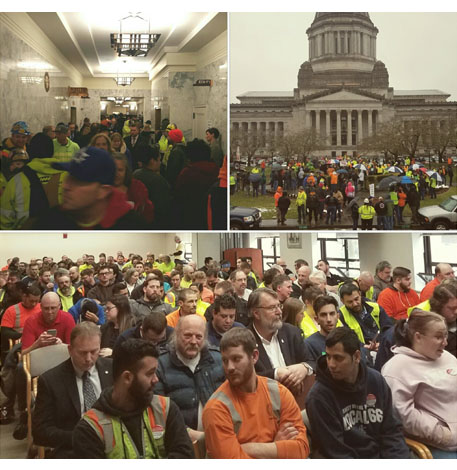STATE GOVERNMENT
Empower inclusive elections with Washington Voting Rights Act
WVRA enables cities and counties to fix unfair, undemocratic voting systems, avoid costly litigation
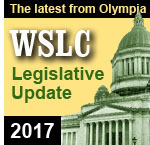 OLYMPIA (Feb. 13, 2017) — Last Wednesday, at the same time more than 1,000 union members — mostly building and construction trades members — were swarming the State Capitol campus during a Senate Republican hearing of a “Right-to-Work” bill, another important piece of legislation was being heard.
OLYMPIA (Feb. 13, 2017) — Last Wednesday, at the same time more than 1,000 union members — mostly building and construction trades members — were swarming the State Capitol campus during a Senate Republican hearing of a “Right-to-Work” bill, another important piece of legislation was being heard.
 The Washington State Voting Rights Act (HB 1800), heard Wednesday in the House state government committee, is about making sure everyone in this state has the opportunity to have their voice heard in local democracy. In too many cities, school districts and local governments across Washington this right isn’t being protected. And if these communities decide to change their election system to make it more fair and inclusive, under current law, the state blocks them from doing so. It’s one of the reasons why people of color are underrepresented at every level of local government across the state. That representation gap has real impact — communities across our state lack access to local decision-makers who know and understand their interests and concerns.
The Washington State Voting Rights Act (HB 1800), heard Wednesday in the House state government committee, is about making sure everyone in this state has the opportunity to have their voice heard in local democracy. In too many cities, school districts and local governments across Washington this right isn’t being protected. And if these communities decide to change their election system to make it more fair and inclusive, under current law, the state blocks them from doing so. It’s one of the reasons why people of color are underrepresented at every level of local government across the state. That representation gap has real impact — communities across our state lack access to local decision-makers who know and understand their interests and concerns.
HB 1800, sponsored by Rep. Mia Gregerson (D-SeaTac) and 42 of her House colleagues, empowers local governments to avoid costly litigation by creating a collaborative process to ensure every vote is protected and that every community is fairly represented. HB 1800 requires plaintiffs who believe an election system is unfair to provide notice before filing suit so local jurisdictions have the opportunity to review the data and make changes to their election system within a 180-day window. If the jurisdiction agrees that a problem exists and chooses to fix their election system in a way that addresses the problem, they avoid litigation and payment of attorney’s fees.
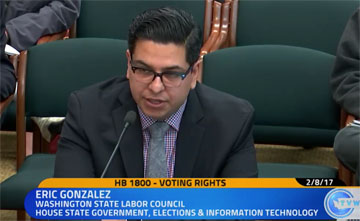 “HB 1800 puts the decision-making back in the hands of the local jurisdiction and its community members,” testified Eric González Alfaro, WSLC Legislative and Policy Director. “It is the only comprehensive solution for addressing local governments’ concerns that their election systems discriminate against certain populations and may be in violation of the federal Voting Rights Act.” (Watch the entire hearing on TVW.)
“HB 1800 puts the decision-making back in the hands of the local jurisdiction and its community members,” testified Eric González Alfaro, WSLC Legislative and Policy Director. “It is the only comprehensive solution for addressing local governments’ concerns that their election systems discriminate against certain populations and may be in violation of the federal Voting Rights Act.” (Watch the entire hearing on TVW.)
HB 1800 is scheduled for a committee vote on Friday, Feb. 17, which is the cutoff deadline for bills to advance from policy committees. The WSLC strongly urges its advancement.
WSLC backs Hanford workers’ comp bill
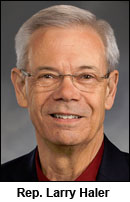 HB 1723, sponsored by Rep. Larry Haler (R-Richland), would remove barriers that prevent seriously ill Hanford workers from getting workers’ compensation benefits. Currently, Hanford workers have to prove that a medical condition was caused by a specific exposure, which is extremely difficult to do because the chemical cocktails they are exposed to are often unidentifiable. Under the bill, many conditions would be automatically assumed to be caused by working at the Hanford nuclear reservation.
HB 1723, sponsored by Rep. Larry Haler (R-Richland), would remove barriers that prevent seriously ill Hanford workers from getting workers’ compensation benefits. Currently, Hanford workers have to prove that a medical condition was caused by a specific exposure, which is extremely difficult to do because the chemical cocktails they are exposed to are often unidentifiable. Under the bill, many conditions would be automatically assumed to be caused by working at the Hanford nuclear reservation.
Former Hanford workers living with debilitating illnesses gave heart-breaking testimony Thursday in the House Labor and Workplace Standards Committee about their diseases’ impact on their lives and their families’ struggle to survive without benefits.
A pattern of denials of Hanford workers’ claims “has had the effect of destroying the health and lives of hundreds of workers and their families at Hanford,” said WSLC President Jeff Johnson, testifying in support of HB 1723. “It is hard not to conclude that at play here is a casual indifference to the lives of these workers and a clear violation of the central tenant of our workers’ compensation law, which is to provide sure and certain relief to injured workers.”
Some important hearings
Most bills have been heard by now and committees are meeting this week to vote on legislation as Friday’s cutoff looms. But…
MONDAY, Feb. 13 at 1:30 p.m. — The House Labor & Workplace Standards Committee hears to labor-supported bills on concerning enforcement of electrical laws (HB 1952) and making sure state WISHA fines for work safety violations are in conformance with federal OSHA penalties (HB 1953).
TUESDAY, Feb. 14 at 8 a.m. — SB 5720 (Hawkins, E. Wenatchee), a WSLC-opposed bill that would create a new “production-based safe harbor” for agricultural employers who have not properly paid their piece-rate workers for breaks and other non-piece-rate work performed, will be heard in Senate Agriculture, Water, Trade & Economic Development.
Stay tuned to The Stand
Right here at The Stand is where you’ll find more information about legislative issues, hearings, and calls to action. Check the State Government section often. Or better still, subscribe to receive The Stand via email each morning.
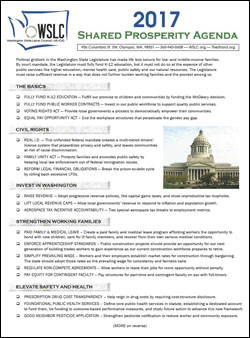 WSLC’s Shared Prosperity Agenda
WSLC’s Shared Prosperity Agenda
This newsletter is intended to highlight the case for and the status of legislation of concern to the Washington State Labor Council, AFL-CIO. See the WSLC’s 2017 Shared Prosperity Agenda for an outline of many of those issues.
Also, there’s much more news from the State Legislature posted each week at The Stand. This past week, it included:
Washington workers in Olympia: HANDS OFF OUR UNIONS! — In the end, more than 1,100 people signed in opposed to SB 5692. Just one person supported it. More than 1,000 union members and supporters, most of them members of building and construction trades unions from around the state, swarmed the State Capitol on Wednesday to voice their objection to SB 5692, legislation to make Washington a “Right-to-Work” state.
WSLC urges renewal of film tax incentive creating jobs in state — HB 1527 and SB 5502 would reinstate a relatively small tax incentive — $3.5 million per calendar year for the next 10 years — called the Motion Picture Competitiveness Program to encourage film making in our state and attract a wide range of associated jobs and economic investment. Delegates representing unions from across the state approved a 2016 Washington State Labor Council resolution supporting Washington Filmworks and its renewal.
Open season on state workers in Republican-controlled Senate — The “Awful 7” anti-state employee bills that went nowhere two years ago hit another tidal wave of opposition in a Senate committee hearing on Monday. The opposition was based on the facts — and personal stories like Local 443 member Bing Bristol who said he’d gotten up at 4 a.m. to shovel snow as part of the Department of Enterprise Services grounds crew. The irony wasn’t lost that Bristol was testifying on a bill that would open state services of the kind he provides to widespread outsourcing.

